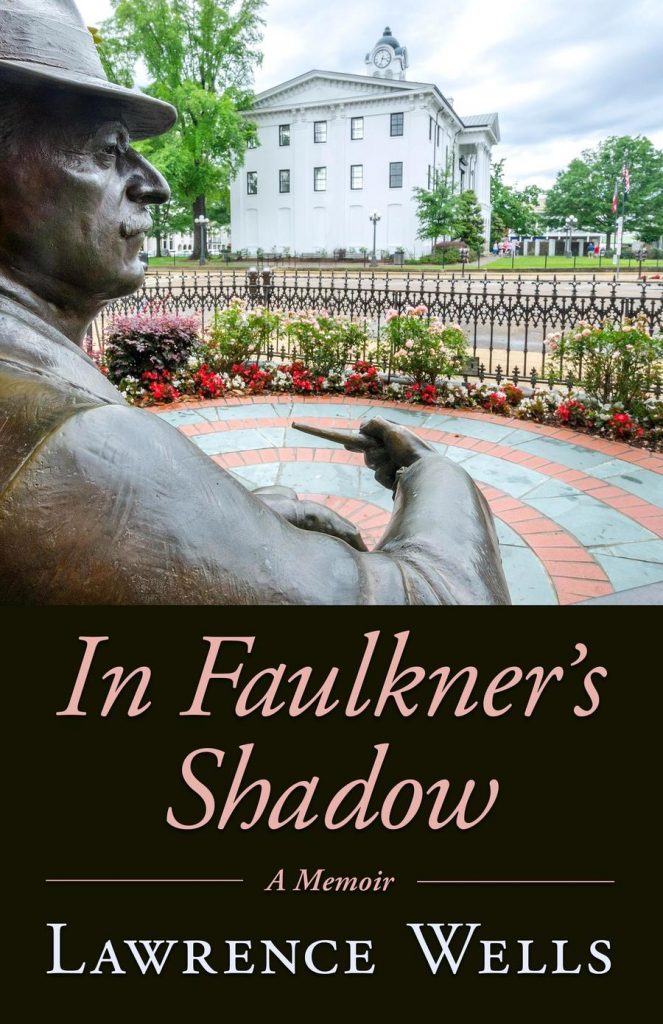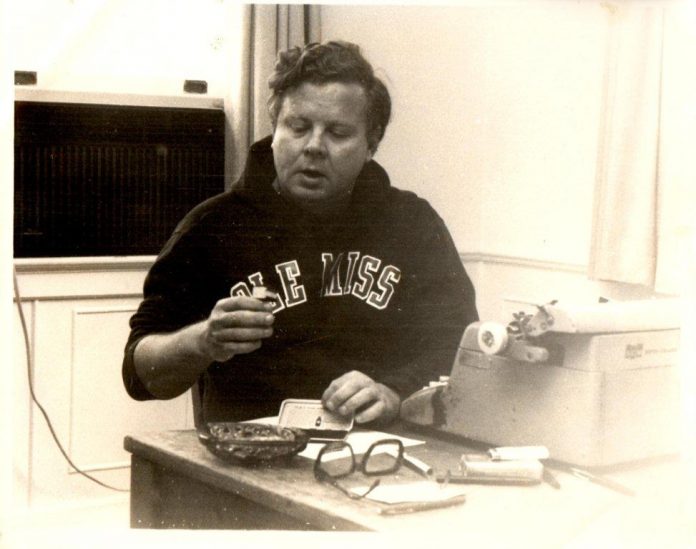
By Lawrence Wells
*Editors note: The following is an excerpt from Lawrence Well’s new book “In Faulkner’s Shadow: A Memoir” (University Press of Mississippi, Fall 2020), available for purchase as of September 15, 2020.
Wells, director of Yoknapatawpha Press in Oxford, Mississippi, describes his memoir as a tale full of personal insights that feature unforgettable characters and exciting behind-the-scene moments that reveal much about modern American letters and the southern literary tradition. It is also a love story about courtship and marriage, and an ode to the late Dean Faulkner Wells, niece of celebrated author William Faulkner, and her family.

I first met Willie Morris, former editor of Harper’s magazine, in 1978 when he was thinking about leaving Bridgehampton, NY, and moving back to Mississippi. In 1980 he became the first writer-in-residence at the University of Mississippi and helped establish a new, post-Faulkner literary era in Oxford.
From 1980 to 1990 along with my late wife and publishing partner, Dean Faulkner Wells, niece and ward of William Faulkner, I edited and published five books by Morris at our independent publishing company, Yoknapatawpha Press. We were one of Willie’s southern publishers for the last twenty years of his life.
In the fall of 1981, Morris joined the journalism faculty at the University of Mississippi. He taught a feature-writing class in which student essays were published in a bi-annual tabloid journal called The Ole Miss Magazine.

Cover of The Ole Miss Magazine, Issue 1, Fall 1981 / Photo provided by Lawrence Wells
“It will be available to town and campus,” he reported to Dean and me at our kitchen table. “And, by the way, at the bargain price of $1.00 per issue!
For admission to his class, Morris interviewed prospective students. He wanted only the top tier. When the semester began he taught the class the same way he’d held editorial meetings at Harper’s, setting up the various departments and discussing ideas for stories. Before he sent them out to gather material, he assigned essays by David Halberstam, Larry L. King, John Corry and Marshall Frady which he’d published in Harper’s. When they were ready to hit the streets and gather material he let them choose their own assignments and accompanied them on fact-finding missions.
At Mr. Levy’s Jitney Jungle grocery store on North Lamar, he pointed out shoppers stopping in the aisles, talking and laughing, how fellow shoppers instead of being irritated struck up secondary conversations. Standing in the aisle, soaking up the atmosphere, Morris jotted down a title, “Litany at the Jitney.” Always start with a title, he told his student-essayists, who today look back on Morris’s class as a pivotal influence.
Willie couldn’t resist contributing to the debut issue of The Ole Miss Magazine. He wrote a eulogy to “Billy Goat Hill”, a grassy knoll behind centerfield in the baseball stadium at the University of Texas, his alma mater. Longhorn outfielders, Willie wrote, had a secret advantage. After practice, they carved footholds in the grass allowing them to back-pedal up the hill to catch fly balls.
I took the same route of my college days when I drove the long stretch from my Mississippi Delta town to Austin in a vintage black and white Plymouth with dual exhausts. Distant expanses of fields, where the courthouses, lazy intersections I once knew, greet me now in the most haphazard déjà vu. Carthage, Palestine, Buffalo, Franklin, Hearne, Rockdale, Thrall—have they existed in a dreamy hush all these years, and awakened now just for me?
– Willie Morris
The magazine writing-and-publishing class provided an opportunity for Morris to teach by example. From the choice of assignments to his legendary hands-on editing, he passed on invaluable lessons. One night after the last call at the Holiday Inn bar, where Morris had convened class (Cokes only for the students, a scholarly ale or two for their professor), he asked me to follow him to 16 Faculty Row. He was eager to show me a mockup of the first issue of The Ole Miss Magazine. Flattered and curious about what topics he’d assigned, I followed him home. We’d barely sat down when he snatched a pen and started editing.

As long as he was upright, alert, and protected from the elements Willie Morris could have edited anywhere, anytime. I watched him transform raw prose into a finished product by deleting a word, adding a modifying phrase, pausing now and then to sip bourbon-flavored coffee, weighing the results on his jeweler’s scales. Editing, to him, was like breathing, and for a brief time, two semesters, perhaps, The Ole Miss Magazine gave him a feeling of being in the saddle.
Editing for publication with none of the pressures of New York City, he flicked away this digression and that cliché, entered the writer’s thought process, and re-shaped the narrative without altering style or voice. I was being made privy to the sure instincts of a professional editor. Looking over his shoulder as he worked, blinking away the cigarette smoke, I knew very well that this was my editing tutorial under Professor Morris. A quiet satisfaction came from him as he worked—not pleasure, exactly, considering this was child’s play for him—but deep contentment. Under his hand, the student-essays, some of them awkward and lacking coordination, became as good as they had a right to be.
Structure was a common problem which Morris solved by simply circling a paragraph and drawing an overlapping arrow stretching from one page to another. Grunting to himself, panting fumes, he touched up each essay, some less than others given the writer’s ability, while leaving style and substance intact. The basic story remained. All he added was shading for depth and focus
Willie knew when to quit. He folded a student paper, creased it down the middle, and said, “Nine down, three more to go.” I doubt he was aware that I marveled at how his editor’s mind worked, how he tiptoed a fine line between polishing and revision, or that I felt deprived when there were no more essays for him to edit.

His influence at the University of Mississippi from 1980-90 can’t be overstated. He dispensed advice in bars, bookstores, homes, football stadiums—anywhere a wannabe writer caught him with time on his hands. His canon, I would submit, can be multiplied a hundred-fold by the output of writers he encouraged. What he showed students over and over was not how to write but how to edit themselves, and that the key is distancing oneself from one’s work.
When my novel Rommel and the Rebel was published I thanked Willie for teaching me to edit myself, the last big hurdle for a writer. He shrugged and said something I’d heard him tell his students:
“It was in you all along. Sooner or later it had to come out.”
LAWRENCE WELLS is the director of Yoknapatawpha Press in Oxford, Mississippi, which he established with his late wife Dean Faulkner Wells. Wells co-founded the quarterly literary journal The Faulkner Newsletter and Yoknapatawpha Review. Author of two historical novels, Rommel and the Rebel and Let the Band Play Dixie, Wells was awarded the 2014 Faulkner-Wisdom gold medal for narrative non-fiction at the Words and Music Festival in New Orleans. He scripted the Emmy-winning 1994 PBS regional documentary Return to the River narrated by James Earl Jones.

Recent Comments